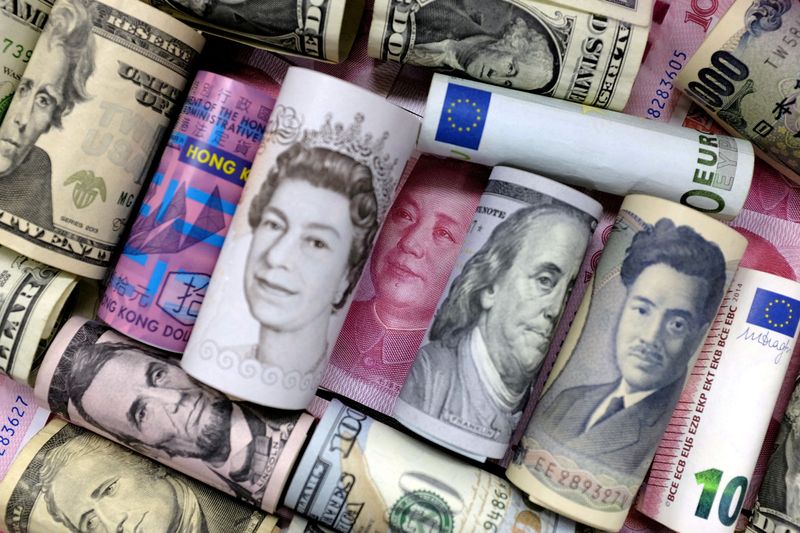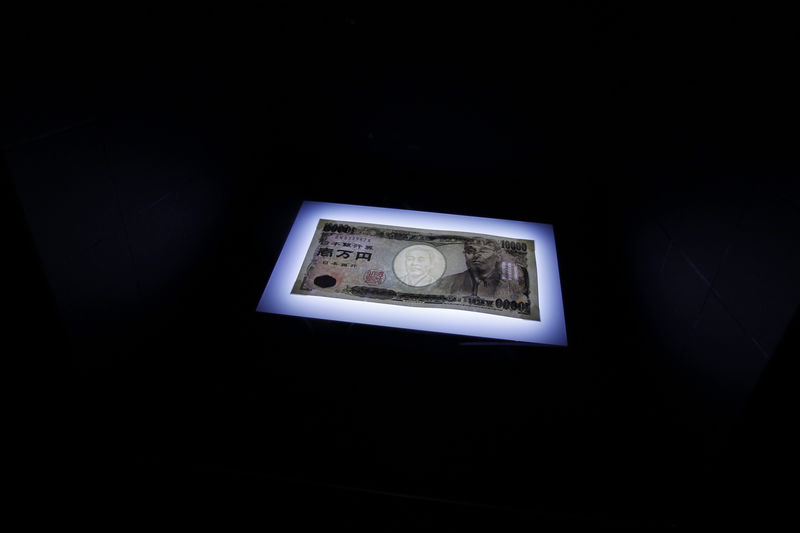
By Samuel Indyk and Kevin Buckland
LONDON (Reuters) – The U.S. dollar regained some ground on Wednesday following big falls against the euro and sterling the day before, while the yen remained mired near 34-year lows even as Japanese officials stepped up intervention warnings.
The – which measures the currency against six major peers including the euro, sterling and yen – was last up 0.2% at 105.84 after earlier touching the lowest since April 12 at 105.59.
It slumped 0.4% on Tuesday, driven by surprisingly robust European activity data and cooling U.S. business growth.
The euro was down 0.1% at $1.0688, following Tuesday’s 0.4% rally after data showed business activity in the euro zone expanded at its fastest pace in nearly a year, primarily due to a recovery in services.
Sterling also benefited from data showing British businesses recorded their fastest growth in activity in nearly a year, while Bank of England Chief Economist Huw Pill said interest rate cuts remained some way off. Sterling was last down 0.1% at $1.2431, having jumped 0.8% in the previous session.
By contrast, U.S. business activity cooled in April to a four-month low due to weaker demand, while rates of inflation eased slightly.
“We’d be cautious about jumping into a bearish narrative on the back of soft activity surveys, as hard data has generally helped the dollar of late,” said Francesco Pesole, FX strategist at ING.
Friday sees the release of the Fed’s targetted consumer inflation measure, the PCE deflator. Markets currently price in a 73% chance of a first U.S. rate cut by September, according to the CME’s FedWatch tool.
remove ads
.
“In the short term I think the dollar will continue to do well,” said Dane Cekov, senior macro & FX strategist at Nordea Markets.
“If U.S. inflation continues to strengthen, the dollar will remain in favour.”
The dollar index reached a 5-1/2-month peak of 106.51 last week as persistent inflation forced Fed officials to signal no rush to ease policy.
YEN CLOSES IN ON 155 PER DOLLAR
As the dollar has rebounded, it marked a new 34-year high against the yen at 154.98.
This week, the pair has oscillated in an extremely narrow range between that high and a low of 154.50, with traders wary that a push above 155 could raise the risk of dollar-selling intervention by Japanese officials. The dollar was last at 154.905 yen.
Japanese Finance Minister Shunichi Suzuki on Tuesday issued the strongest warning to date on the chance of intervention, saying last week’s meeting with U.S. and South Korean counterparts had laid the groundwork for Tokyo to act against excessive yen moves.
Senior ruling party official Takao Ochi told Reuters that a decline in the currency towards 160 could trigger intervention.
“If the yen slides further toward 160 or 170 to the dollar, that may be deemed excessive and could prompt policymakers to consider some action,” Ochi said.
The Bank of Japan is widely expected to leave policy settings and bond purchase amounts unchanged at the conclusion of a two-day meeting on Friday, having just raised interest rates for the first time since 2007 just last month.
remove ads
.
And while Japan’s central bank is likely to signal a readiness to tighten policy again this year, its ultra-cautious, data-dependent approach has limited any strengthening in the yen.
“Talk is cheap and what’s really needed to stabilise the yen is essentially either the Fed cutting or higher rates in Japan,” Nordea’s Cekov said.
The climbed 0.3% to $0.6506, after pushing as high as $0.6530 for the first time since April 12, as it rallied on the back of hotter than expected consumer price data, leading markets to abandon hopes for any rate cuts from the Reserve Bank of Australia in the near term.
(This story has been corrected to add a missing digit in paragraph 3)

